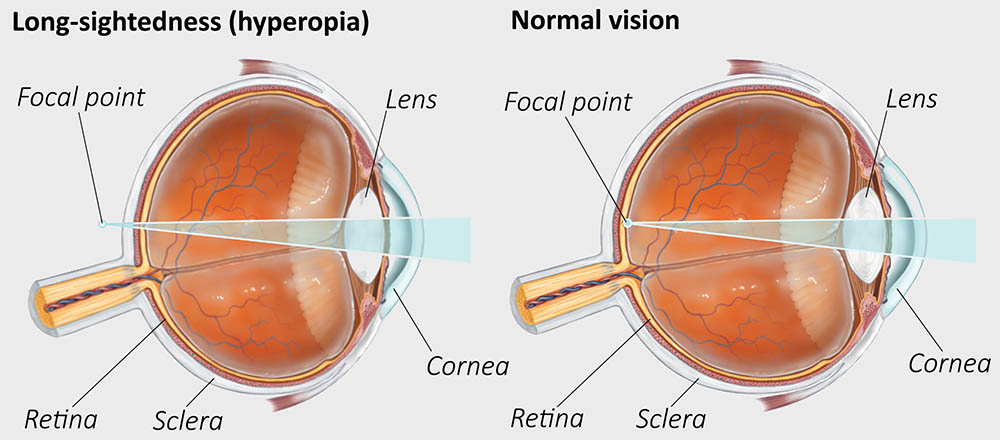
Having problems seeing those up-close items but are a whiz at reading those street signs 20 metres away? Chances are you’re longsighted. Long-sightedness, medically known as Hyperopia, is a common vision problem that commonly goes untreated and undetected by its holder. Hyperopia is one of the top 5 most common age-related eye problems and is also one of the easiest to treat. It’s important to know the who, what, when, where, why and how of long-sightedness before booking your next eye exam.
What is long-sightedness?
Long-sightedness is a common condition affecting the beholder’s ability to see both close and far objects. Those suffering from long-sightedness are able to see long-distance items clearly but struggle to focus on those close to them. Those with mild long-sightedness are most likely unaware they hold the condition as the lens will correct itself to make close objects appear clear.
Common symptoms of long-sightedness include:
- Seeing distant objects clearly but nearby objects distorted or blurred
- After long periods of close up activities (reading, writing, computer work), having weary eyes, headaches or fatigue
- Feeling the need to “screw up” or blink your eyes more frequently to enhance your vision
Who can develop long-sightedness?
Long-sightedness can affect people of all ages, genders, and ethnicities. Long-sightedness may develop with age as adults reach the ages of 40+ years but many can develop this earlier for reasons unknown.
Many children often suffer from long-sightedness and some with age, self-solve the problem as the eyes lengthen with growth. However, children that suffer from Hyperopia may not be aware of the problems with their eyes as they are unaware their vision is impaired. Some symptoms shown by children include a squint where a singular eye begins to turn inwards whilst the eye focuses on a nearby object. If left untreated in young children, this squint may develop into a lazy eye. If unsure, we recommend bringing your child in as early as possible to have their eyes checked. At Adelaide City Optometrist, Paul specialises in children’s vision to ensure that your child is getting the best start to their life visually.
Why does it occur?
During regular, unaffected vision, light will be focused by the cornea and lens, to then form a clear image on your retina. Long-sightedness occurs due to a refractive error, where light is again focussed by the cornea, but this image will be in focus behind the retina at the back of the eye leaving the image blurry or distorted.
How do you treat long-sightedness?
Most people affected by long-sightedness wear corrective lenses in the form of glasses or contacts. However, there are some laser treatments available that come with higher risks. Contact lenses can be recommended for those who do a lot of close up work daily. Glasses can be worn either all the time or only when completing up-close work (reading, writing, etc.). Laser refraction surgery can also help treat adults with long-sightedness. However, laser surgery is not recommended for children. Those with less severe long-sightedness may not need treatment as their eyes will naturally adjust over time to see clearly.
Where can it be treated?
Long-sightedness can be treated and discovered at your local optometrists with regular eye tests. Scripts, eyeglasses or contact lenses can be arranged by your local optometrist. Adelaide City Optometrist offers all these services and more. Either call (08 8224 0819) or book online today.
At Adelaide City Optometrist we try to offer the best vision options. Every set of glasses are fitted and centred to your eye. Our digital fitting system accurately measures how each frame sits in relation to your face, taking into account your nose, head tilt and ears. We use German engineered, Zeiss lenses. Why? Simply put they are the best. Our lenses all have 100% UV filter and come with a Duravision Platinum coating, a substance that is 250 times thinner than a piece of paper and 3 times more robust than any anti -scratch and anti-reflective coating available in the current market.
Concerned about your vision?
Call us today to ask any questions or book your next appointment.
Quick Answers
What does long-sighted (Hyperopia) mean?
Long-sightedness is a common condition affecting the beholder’s ability to see both close and far objects. Those suffering from long-sightedness are able to see long-distance items clearly but struggle to focus on those close to them. Those with mild long-sightedness are most likely unaware they hold the condition as the lens will correct itself to make close objects appear clear.
Who can become long-sighted?
Long-sightedness can affect people of all ages, genders, and ethnicities. Long-sightedness may develop with age as adults reach the ages of 40+ years but many can develop this earlier for reasons unknown.
How do you treat long-sightedness?
Most people affected by long-sightedness wear corrective lenses in the form of glasses or contacts. However, there are some laser treatments available that come with higher risks. Contact lenses can be recommended for those who do a lot of close up work daily.


